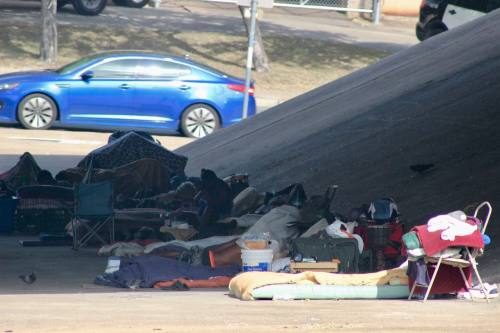A potential court battle is brewing that could impact the future of laws on public camping, sitting and lying down across the country. The state of Texas has joined the action, and an influential downtown Austin stakeholder group has issued support for the state.
When Austin City Council
voted in June to decriminalize public camping, sitting and lying down—bans on which had been said to criminalize the status of homelessness—supporters pointed to a decision by the U.S. Ninth Circuit Court of Appeals. In that case, Martin v. City of Boise, the court ruled laws such as Austin's that criminalized involuntary actions derived from a person’s status—such as sleeping or sitting on public property if you are homeless—violated the U.S. Constitution’s Eighth Amendment clause against cruel and unusual punishment, so long as there were fewer shelter beds than homeless people in the city. Now, the city of Boise, Idaho, is challenging the ruling and asking the U.S. Supreme Court to take up the case. Several states, cities and organizations have filed support for Boise’s challenge, including the state of Texas.
In its petition to the Supreme Court, filed in August, Boise argued the court's ruling has kept the city from maintaining clean and safe public spaces and that the old laws incentivized the homeless population to come to shelters and receive services. The city also said that although the Eighth Amendment can keep governments from penalizing a person’s status, it cannot keep governments from regulating all “involuntary” conduct related to that status. The city cites in the case an example of an alcoholic who cannot resist the compulsion of drinking choosing to drink in a public space.
Texas voices support of overturning the ruling
Texas has joined Boise—along with Idaho, Alaska, Indiana, Louisiana, Nebraska and South Dakota—in urging the Supreme Court to take up the case. The seven states filed a brief with the court Sept. 24 that said the lower court’s decision ran against states’ rights under the 10th Amendment to fashion their own laws in dealing with complex issues, such as homelessness and beyond. They also reasserted Boise’s argument that blocking regulations of involuntary conduct related to status is a slippery slope.
“By holding that criminal penalties also may not be imposed for involuntary conduct derivative of an individual’s status, the Ninth Circuit swung a wrecking ball through states’ rights under the 10th Amendment to protect public health and safety and to fashion their criminal laws,” the brief read. “Many important state laws and regulations could be deemed unconstitutional if the conduct prohibited is found to be the involuntary product of a compulsion stemming from an individual’s status, including prohibitions on … ‘biologically compelled’ acts such as public urination, defecation and public sex acts; and criminal acts such as murder, trespass, drug use, and child sex abuse.”
Local stakeholders push for federal intervention
The International Downtown Association filed a separate brief in support of Boise with other organizations, such as the California Downtown Association and the Downtown Property Owners Association. And recently, Austin’s own Downtown Austin Alliance, an influential downtown stakeholder group, has come out in support of the effort to have the Supreme Court reopen the case.
“The Ninth Circuit’s decision in Martin has inflamed the homelessness crisis by fomenting uncertainty among local governments struggling to balance their need for clean and safe streets, and the civil rights of those who live on them,” the brief read. “And as governments’ hands are being tied, the private sector is left little choice but to intervene for the public good or risk ruin.”
The International Downtown Association-led brief has a full section dedicated to what has happened in Austin since the city decriminalized public camping, sitting and lying down. The brief—notably, without citation—paints a picture of significant fallout as a result of the ordinance changes. It says companies have regretted expanding in the downtown area, an increasing number of tourists report they will never return, and convention groups are choosing other cities instead of Austin, “citing incidents of aggressive behavior and the perception of lack of public safety as reasons.” The brief says the issue has consumed the Downtown Austin Alliance leadership.
“Without guidance from this court, Austin remains paralyzed and its community in crisis,” the brief reads. “Its homeless—desperately in need of help—will begin to deteriorate and soon may resemble those in California.”
Dewitt Peart, president and CEO of the Downtown Austin Alliance, said in a statement the court documents should come as a “serious warning to our civic leaders.”
“We believe our city is at a critical tipping point,” Peart said in a statement issued Sept. 26, "and that immediate actions are needed to prevent Austin from following the path to crises already being experienced in Los Angeles, San Francisco, Seattle, Portland and Sacramento, as documented thoroughly in the amicus brief.”
Austin Mayor Steve Adler said whatever the court decides will either make it easier or harder for Austin to end homelessness. However, he said the issue still remains that the city needs to build more housing and shelter, and that is what the city will continue to focus on.
On Sept. 20,
City Council attempted to make adjustments to its decriminalization of public camping, sitting and lying down. However, council members said they needed more time and voiced frustration with the process.





